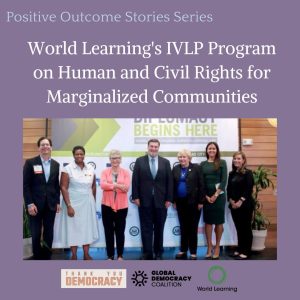World Learning Positive Outcome Story: World Learning’s IVLP Program on Human and Civil Rights for Marginalized Communities

A State Department-funded International Visitor Leadership Program (IVLP) project on “Human and Civil Rights for Marginalized Communities,” implemented by World Learning, aimed to address systemic issues related to human and civil rights violations against marginalized communities. Participants from diverse global backgrounds sought to understand best practices for preventing human rights abuses, advocating for legislative reforms, and promoting inclusivity and tolerance.
The IVLP project successfully reinvigorated and protected democratic values by providing participants with practical knowledge and innovative strategies. Thanks to the program, participants engaged with U.S. organizations and government bodies to learn effective methods for documenting human rights abuses and advocating for the rule of law. For instance, meetings provided insights into handling protests and freedom of speech issues, inspiring participants to develop similar frameworks in their own countries. Furthermore, the program fostered a deeper understanding of advocacy strategies to reform discriminatory laws and policies. Participants planned to integrate these strategies into their organizational frameworks, enhancing their capacity to fight for justice and equality. The inclusion of participants with disabilities highlighted the importance of accessibility in human rights work.
1) Policy Changes and Legislative Advocacy: The IVLP project equipped participants with the tools to advocate for policy changes in their home countries. Discussions on reforming discriminatory laws and promoting legislative protections were pivotal in shaping future advocacy efforts.
2) Enhanced Rights and Inclusivity: The program’s emphasis on inclusivity and accessibility resulted in tangible improvements, such as better accommodation for participants with disabilities and increased awareness of their needs. This focus on diversity and inclusion is crucial for building more equitable societies.
3) Increased Political Representation: Engaging with leaders like Mary Kunesh, the first Indigenous woman elected to the Minnesota Senate, inspired participants to support political representation for marginalized communities in their own countries. This exposure to diverse political leaders underscored the importance of representation in democratic processes.
4) Improved Electoral Processes: By learning about the U.S. electoral process and the importance of free speech and assembly, participants gained insights into improving electoral transparency and fairness in their home countries. The program emphasized the need for robust democratic institutions that uphold the rights of all citizens.
The project has made significant strides in promoting democratic values by equipping global leaders with the knowledge and tools to advocate for human rights, inclusivity, and political representation. These efforts have not only impacted the participants but also hold the potential to bring about meaningful change in their respective countries.
